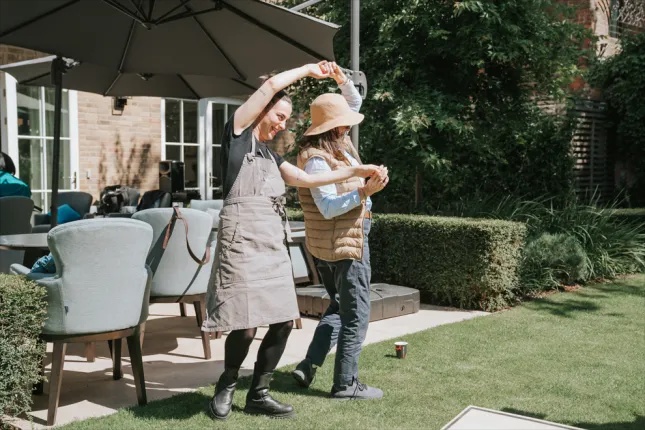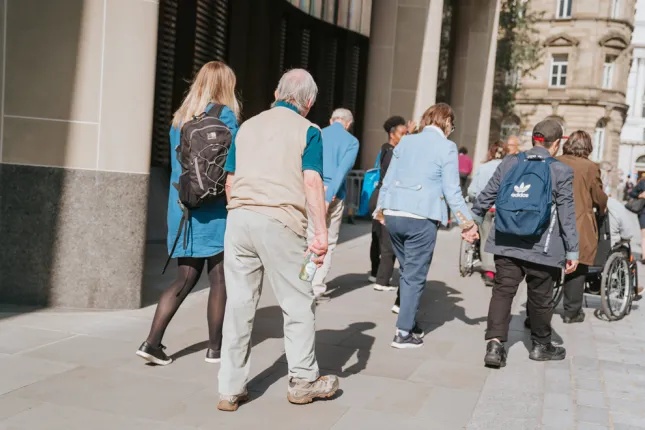Staying Fit and Active in Later Life
As we age, keeping fit and active becomes essential, not just for physical health, but also for mental wellbeing and quality of life. For people in their 70s and beyond, and especially those managing conditions such as dementia or Parkinson’s disease, regular activity can make a significant difference to their quality of life. The benefits of exercise extend beyond strength and mobility; they include sharper cognitive abilities, better mood and greater independence.
Brigid Duffy, Loveday’s Resident Physiotherapist has been working with our Members since we opened our first care home in 2018 and has immense experience in working with the elderly. Below she shares her insights and tips for later life fitness to help more people enjoy an active, healthier life.
Why Staying Active Matters in Later Life By Brigid Duffy
Ageing naturally brings changes in the body: muscles weaken, bones lose density and balance and coordination may also start to decline. However, staying active can slow these changes. Here’s how exercise can benefit older adults:
- Improves Mobility and Balance: Regular exercise strengthens muscles and enhances joint flexibility, which are crucial for balance and reducing the risk of falls. Many older adults experience a loss of mobility, but with the right exercises, you can maintain or even improve it.
- Supports Mental Health: Physical activity releases endorphins, the “feel-good” hormones, which help reduce feelings of anxiety and depression. This can be particularly beneficial for people living with dementia or Parkinson’s, as these conditions often impact mood.
- Boosts Cognitive Function: Studies show that physical activity improves memory and cognitive function, particularly important for those at risk of or living with dementia. Exercise increases blood flow to the brain, which supports brain health and may slow cognitive decline.
- Promotes Independence: Physical fitness supports everyday activities, like dressing, bathing and moving around the house. Staying active empowers older adults to maintain independence for as long as possible.
- Reduces Pain and Stiffness: Many people experience stiffness or pain in joints as they age, especially those with arthritis. Regular, gentle exercise can ease joint pain by increasing flexibility and muscle strength. Moving your joint also lubricates it, pushing excess fluid into your body’s drainage system. This in turn reduces pain as it is swelling that causes pressure felt as pain.
Tips and Exercises
Choose from the most desirable suites, offering stunning views and unparalleled access to Loveday’s world-class amenities. Each suite is a haven of elegance and comfort, enhanced by the welcoming touch of freshly arranged flowers upon your arrival.
Additional Tips for Safe and Enjoyable Exercise
- Take it Slow and Listen to Your Body: Start small, especially if you’re new to exercise. Pay attention to how you feel, and don’t push too hard. Over time, you can build up strength and endurance at your own pace.
- Incorporate Social Elements: Exercising with others can make the activity more enjoyable and motivate you to stay consistent. Many care homes or community centres offer group exercise classes, which are great for social interaction.
- Stay Hydrated: Older adults often experience decreased thirst, but staying hydrated is essential, especially when active. Keep water nearby and sip throughout the day.
- Work with a Physiotherapist: A physiotherapist can provide personalised guidance and ensure exercises are performed safely, especially if you have health conditions. They can also modify exercises to meet individual needs.
- Set Realistic Goals: For older adults, setting small, achievable goals helps maintain motivation. Goals could be as simple as increasing daily steps or adding one more repetition of an exercise each week.
Staying Active with Dementia or Parkinson’s
For individuals living with dementia or Parkinson’s, staying active may present unique challenges. However, gentle, repetitive exercises can be very effective, as they’re easier to remember and follow. Simple activities like dancing, seated stretches, or walking are often manageable and enjoyable. In addition, rhythmic activities, such as – Tai Chi can support coordination and balance, which are often affected by Parkinson’s.
In care home environments, staff may incorporate music or familiar cues to encourage engagement in physical activity. Music can be especially beneficial for people with dementia, as it stimulates the brain and can improve mood and participation.
The Path to a Healthier Later Life
Staying active in later life doesn’t require intense workouts; it’s about maintaining mobility, enjoying movement and supporting mental health. Exercise can look different for everyone, but even small efforts contribute to long-term wellbeing. For those living in care homes, or managing conditions like dementia or Parkinson’s, a few simple, targeted exercises can bring joy, comfort and a greater sense of independence.
It’s never too late to start moving. Begin with gentle exercises, listen to your body, and most importantly, find enjoyment in each movement. Small, consistent steps can have a big impact on your health, happiness and overall quality of life.









